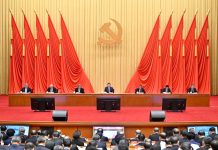SHANGHAI: The Information Office of the Shanghai Municipal People’s Government unveiled the “Shanghai Through Our Eyes” video series as part of efforts to mark the 100th anniversary of the founding of the Communist Party of China this year.
Comprising 100 short videos produced by Xinmin Evening News, the series aims to share stories of Shanghai’s development through the eyes of foreigners living in the city.
According to the information office, the foreigners come from all walks of life and include scientists, entrepreneurs, experts, scholars, artists and even sports stars.
“We have interviewed 100 people from political, business, and intellectual communities and they are going to share their feelings and experiences about the city, and we believe that such storytelling will help you gain a better understanding of the Communist Party of China,” said Zhou Huilin, head of the municipal publicity department.
Zhou also addressed the foreign journalists that were present, calling for them to “consistently adopt a fair and objective position, dive deeper into the reform initiatives of Shanghai and produce more truthful and vivid news reporting in order to help the international community better understand the CPC”.
Also in attendance at the event was two-time Academy Award-winning British director Malcolm Clarke, who is among the 100 foreigners featured in the series.
Clarke, who has been living in Shanghai for the past few years, spoke to members of the media about his upcoming documentary Viral, which was filmed in Wuhan, the first epicenter of the COVID-19 pandemic.
The documentary chronicles the events that took place during the initial stages of the pandemic and contains interviews with a host of people including local medical workers, senior officials and even traders from the wet market.
Looking back at the crisis, Clarke voiced his approval of China’s handling of the situation, saying that the country managed to get the outbreak under control due to “decisive, strong, smart decisions that were made very early”.
“I think it’s better if a Western tells the story (about Wuhan). Because there’s always an aspect of people not believing in China and a lot of anti-China feeling today.
I think telling it through a Western’s eyes is probably a stronger way to explain to the world what really happened,” he said.
– The Daily Mail-China Daily News exchange item






